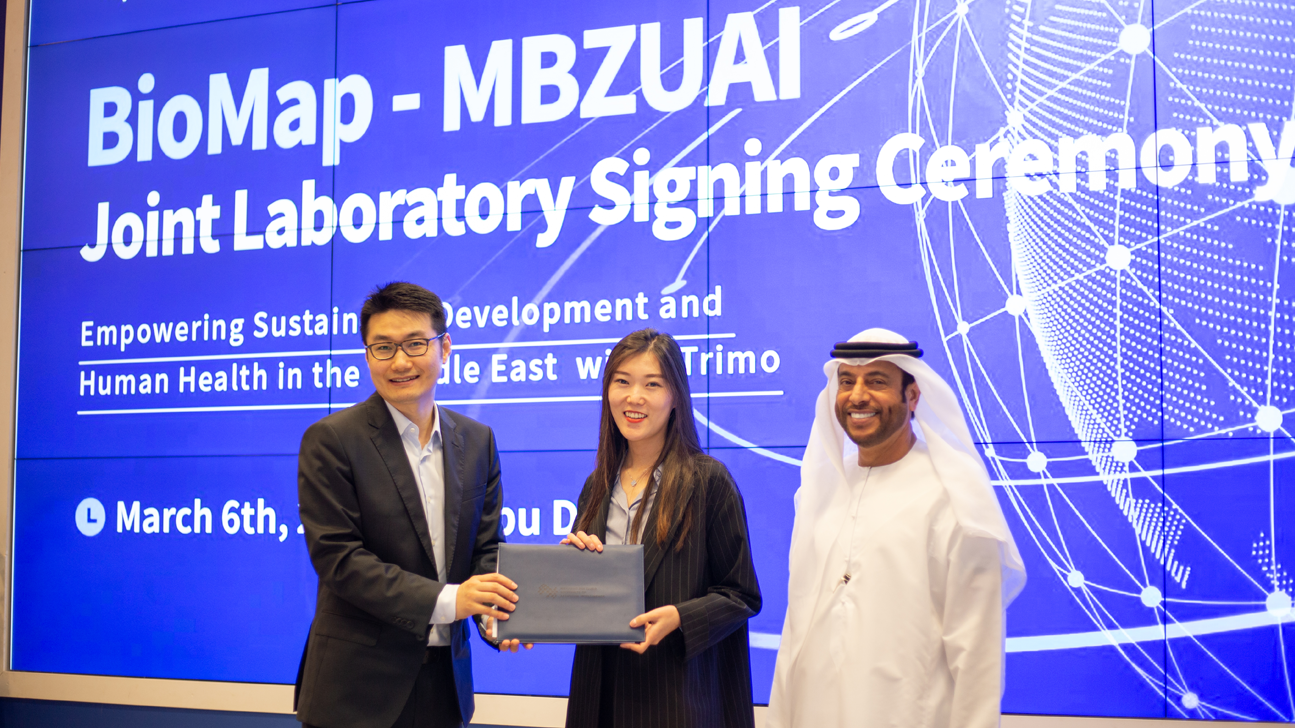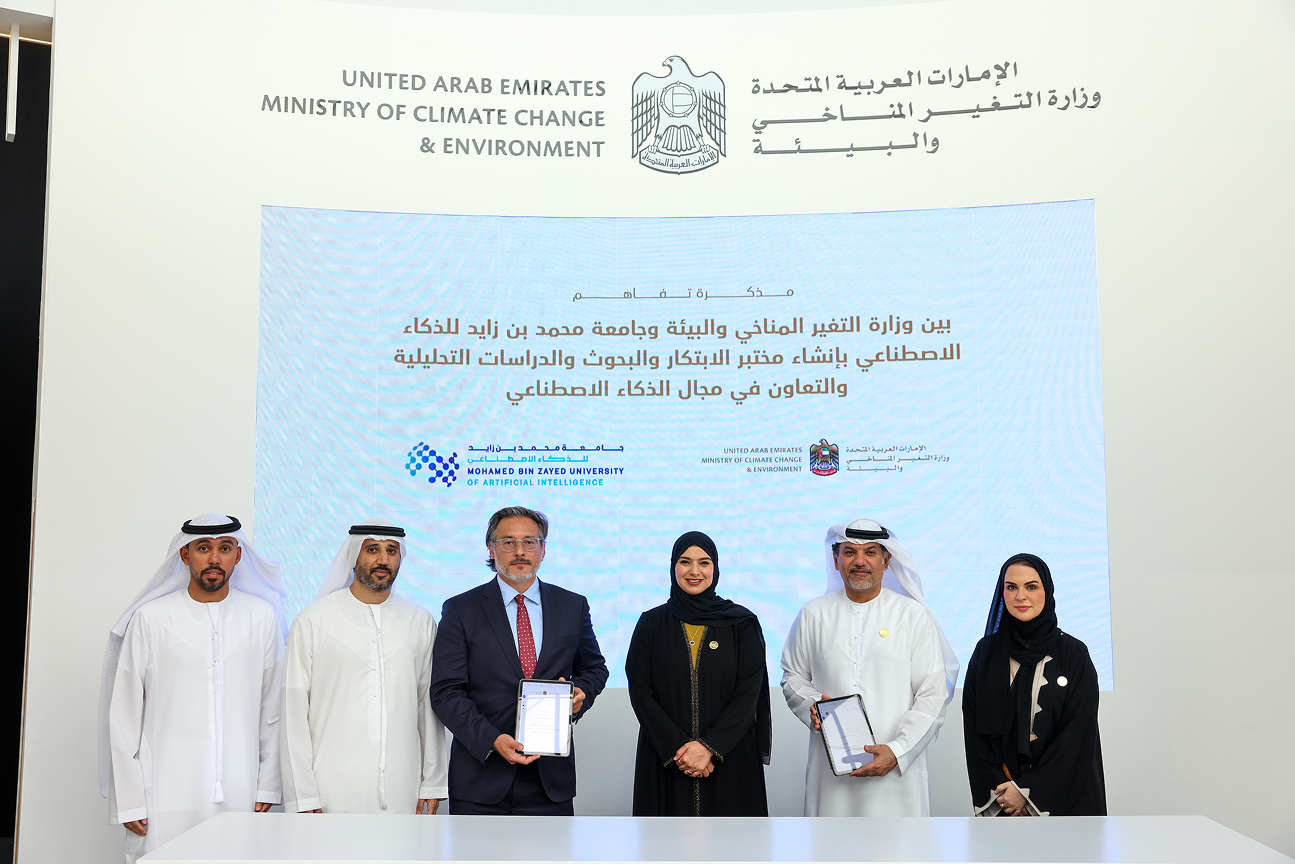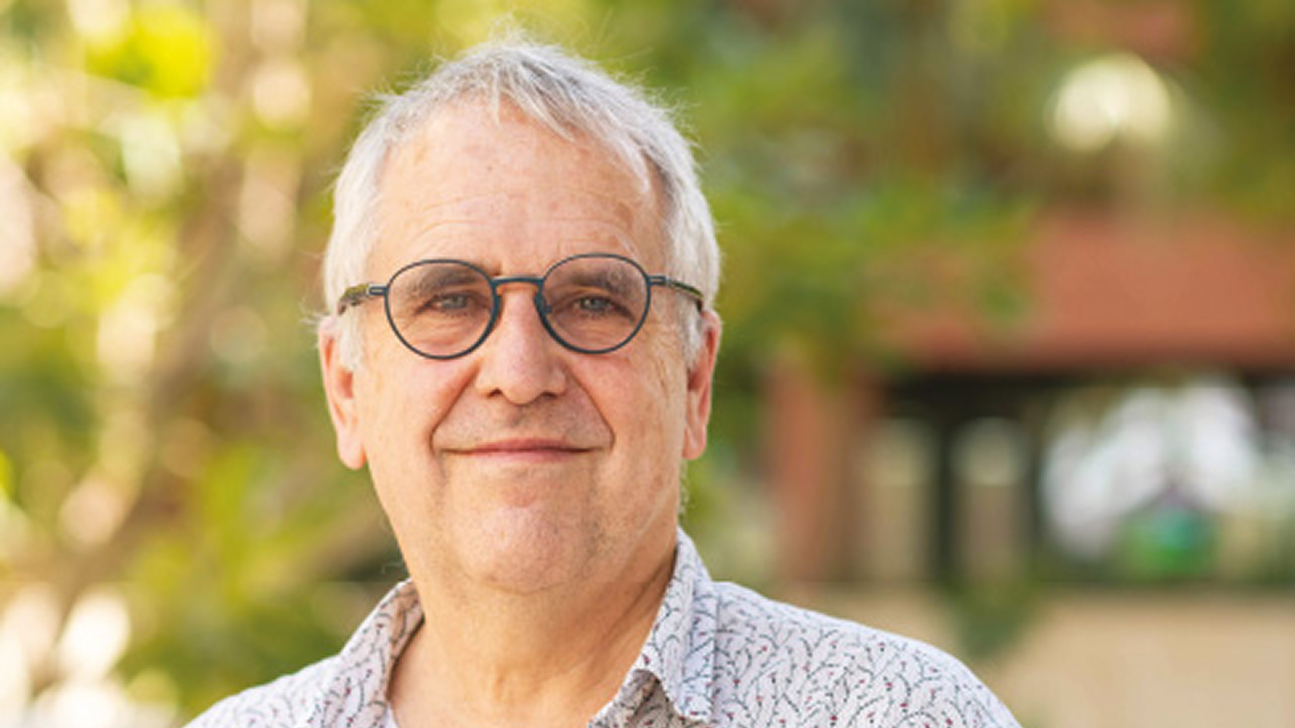MBZUAI and BioMap establish first biocomputing innovation research lab in Middle East
Wednesday, March 15, 2023

Mohamed bin Zayed University of Artificial Intelligence (MBZUAI) and BioMap signed a historic memorandum of understanding (MoU) on the university’s Masdar City campus to establish a biocomputing innovation research laboratory. The laboratory, which is the first of its kind in the Middle East, is being established to address critical life-science needs for the UAE, and for the region.
The MoU was signed by BioMap Vice President of Strategic Development Jiarun Qu, and by MBZUAI Deputy Department Chair of Machine Learning and Director of the Center for Integrative Artificial Intelligence (CIAI) Professor Kun Zhang. The MoU outlines how the two parties will collaborate on the application of AI protein generation capabilities to large-scale life science models to help promote sustainable development and improve human health in the Middle East.
“We’re excited to partner with BioMap on this ground-breaking project,” Zhang said. “We will collaborate to fast-track both energy sustainability solutions and the creation of new drugs that could help treat aging-associated diseases. The University is establishing itself in the AI and Healthcare space with faculty and students dedicated to research that is making drug design faster, more affordable and more sustainable.”
The two parties will focus on creating breakthroughs in AI generated proteins (AIGP) in line with the needs of the Middle East’s most pressing needs in medical health, drug design, energy, and environmental protection. Harnessing joint capabilities, the two parties aim to explore new technologies to advance protein generation, protein structure prediction, cell function prediction, and other foundational life science challenges.
“We’re thrilled to be partnering with world-class AI universities like MBZUAI, and working alongside top local talents,” Jiarun Qu said. “By bringing together our experimental expertise with MBZUAI’s cutting-edge AI technology and life science research, we can supercharge the application of AI large-scale models in the life science industry. And that means we can help improve human health and pave the way for a sustainable future.”
Advancing sustainability and health research
The joint laboratory will carry out research in two distinct directions: the de novo design of oil degradation enzymes, and in the identification of potential drug targets for the treatment of aging-associated and rare diseases.
In recent years, scientists have explored the use of enzymes to efficiently degrade contaminants caused by oil. For example, alkane oxygenases are major components of crude oils that are commonly found in oil-contaminated environments. Although there are various kinds of alkane oxygenase extracted from microbes, those enzymes usually require a higher temperature to function with ideal catalytic activity, which is actually not the case in marine oil spills, oil and gas storage, and transportation.
In the media
The joint laboratory will explore the de novo design of new proteins that can improve alkane oxygenase catalytic function under lower temperature and without the help of coenzymes. Such proteins could enhance the performance and broaden the applications of oil degradation enzymes and oil recovery enzymes by optimizing their catalytic efficiency under different conditions.
Alongside sustainability research, the two parties will also focus on scientific research on aging-associated diseases. According to the World Health Organization, by 2050 the global population of people aged 60 years and older will double to 2.1 billion, and with it, the world will see a surge in aging-associated diseases. The two parties will collaborate using large-scale AI models and multi-omics pre-training to accelerate the discovery of drug targets for aging-associated diseases, enabling the development of personalized treatments.
About BioMAP
Founded in 2020, BioMap is a disruptive super-scale AI model-powered life science platform. The platform aims to leverage cutting-edge AI and Biotech to tackle the grand challenge of decoding life and solving the most valuable problems in life science industry, such as target discovery, de novo drug design and enzyme optimization.
With BioMap’s AIGP (AI generated proteins) platform, scientists are capable of modeling life from protein to system level, conducting dialogue with the system via de novo generated proteins, and realizing specific biological functions.
The company has established over 12,000 m2 of high-throughput labs in Beijing, Suzhou, and Silicon Valley, and has grown its professional team to over 200 members, led by world-class experts. So far, BioMap has initiated over 30 in-house R&D projects of immune-oncology and autoimmune diseases and built more than 10 co-development collaborations with leading institutions globally through its AIGP platform.
For more information about BioMap, please visit: https://www.biomap.com/
- university ,
- partnerships ,
- research ,
- sustainability ,
Related
MBZUAI to launch lab at UAE’s Ministry of Climate Change and Environment
New lab will support advancing agricultural sustainability in the UAE through research and analysis.
- ai lab ,
- partnerships ,
- sustainability ,
- agriculture ,
- MoUs ,
- environment ,
MBZUAI Strengthens Research Ties with France’s École Polytechnique
Mohamed bin Zayed University of Artificial Intelligence (MBZUAI) will deepen ties with France’s AI ecosystem in 2025.....
- MBZUAI ,
- partnership ,
MBZUAI and Berkeley explore the future of machine learning
Machine learning pioneer Michael I. Jordan was among the speakers discussing the cutting-edge ideas shaping the field.
- berkeley ,
- workshop ,
- ML ,
- collaborations ,
- innovation ,
- research ,
- machine learning ,


